Charles E W Bean, Diaries, AWM38 3DRL 606/261/1 - 1929 - 1930 - Part 4
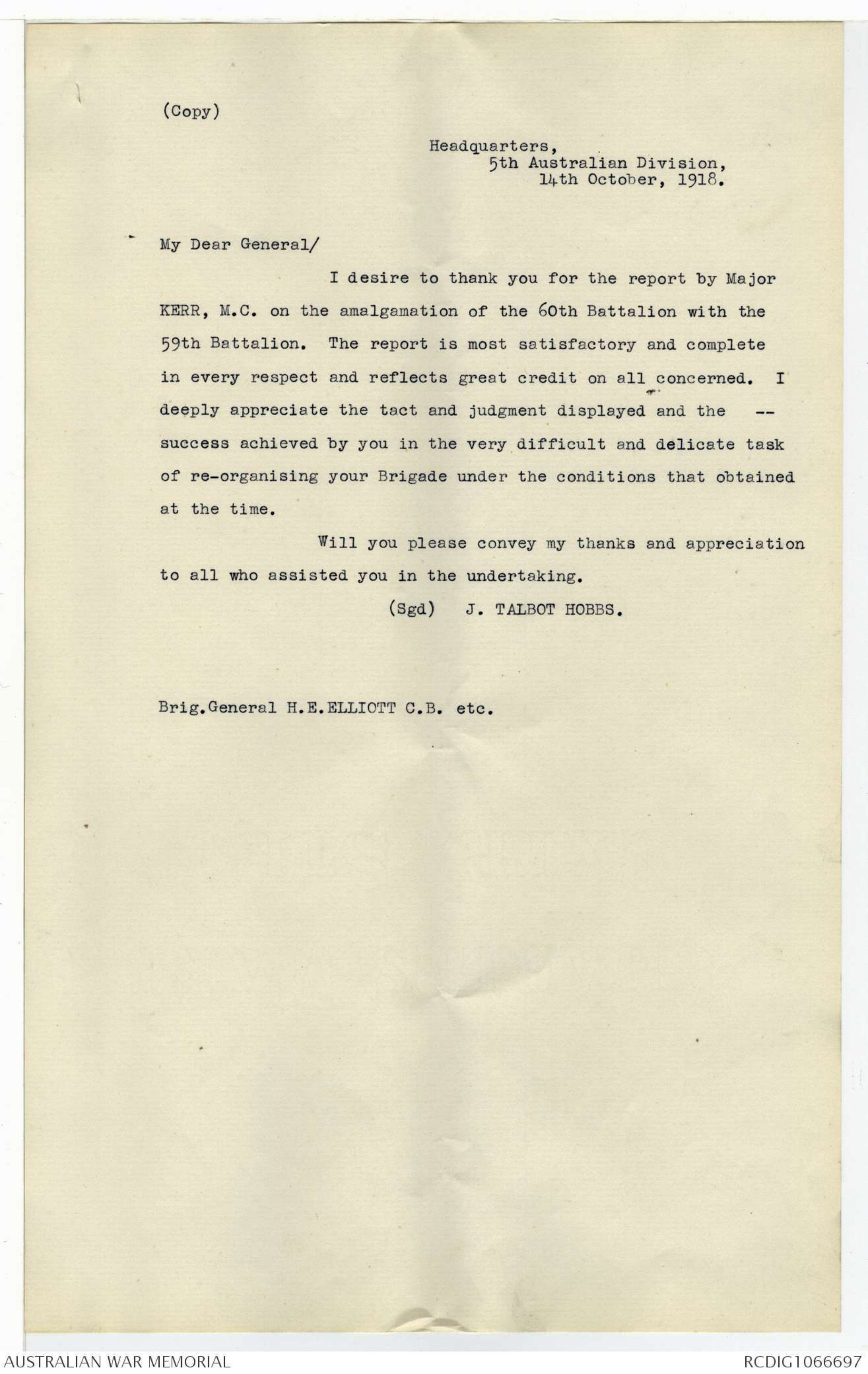
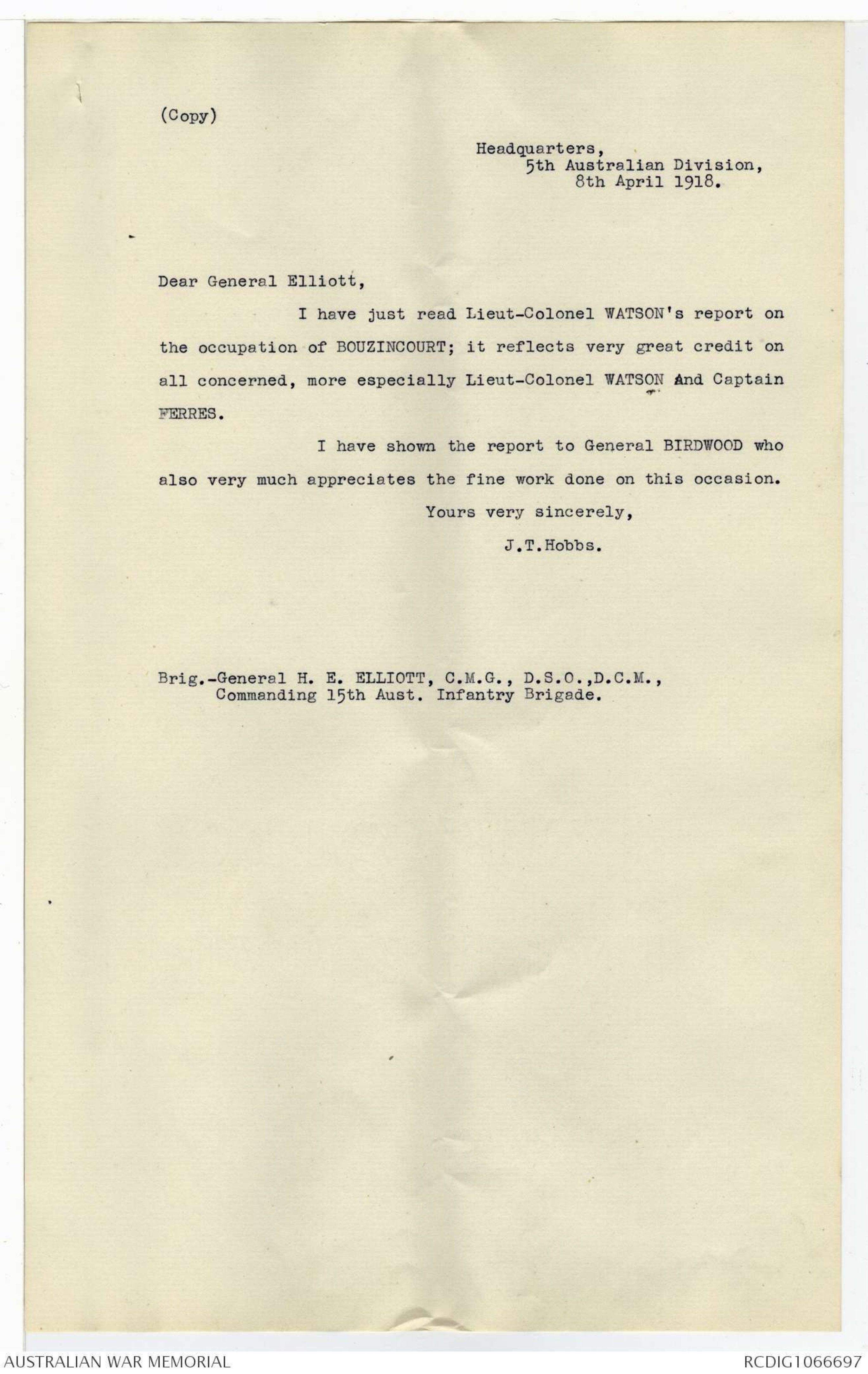
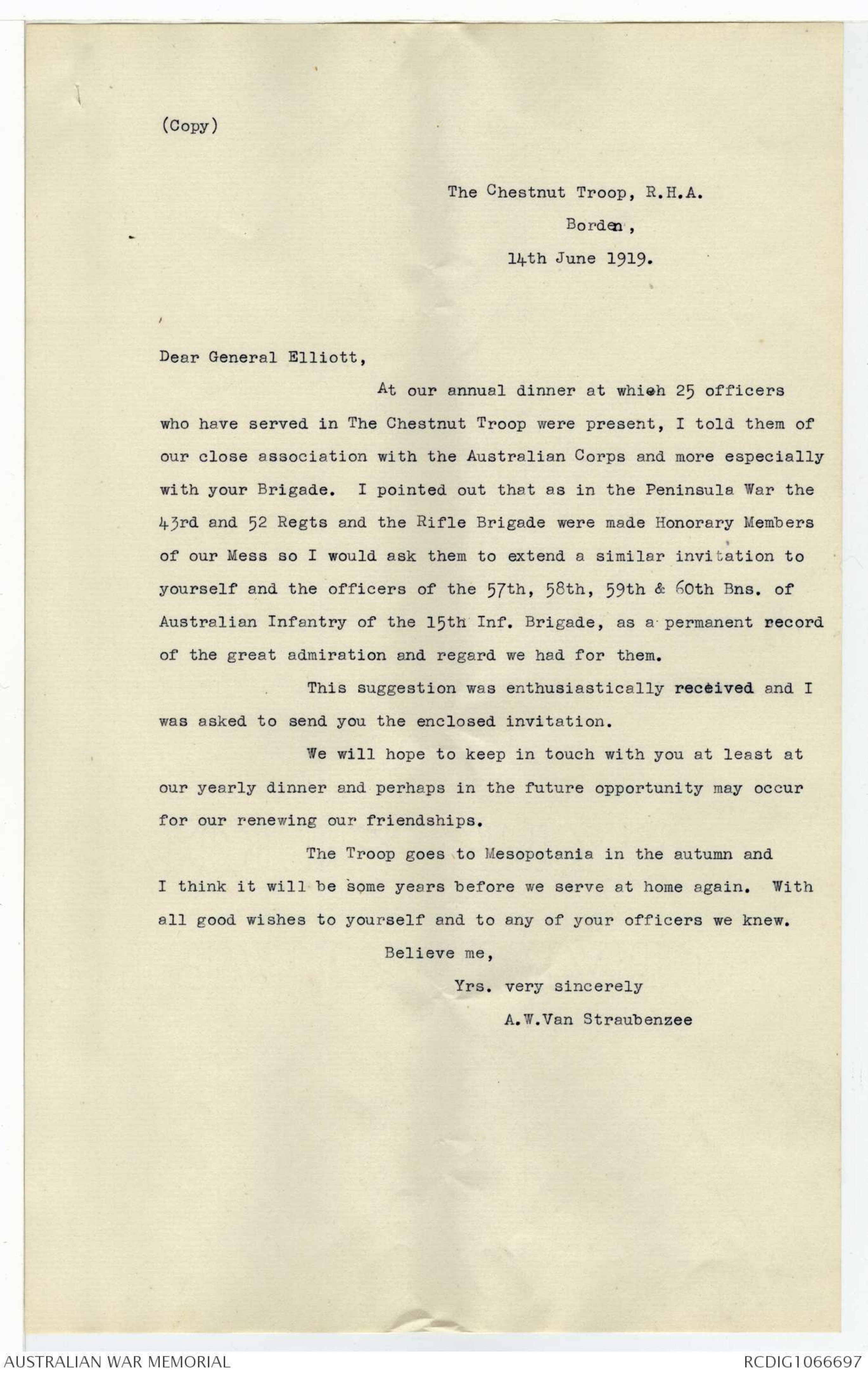
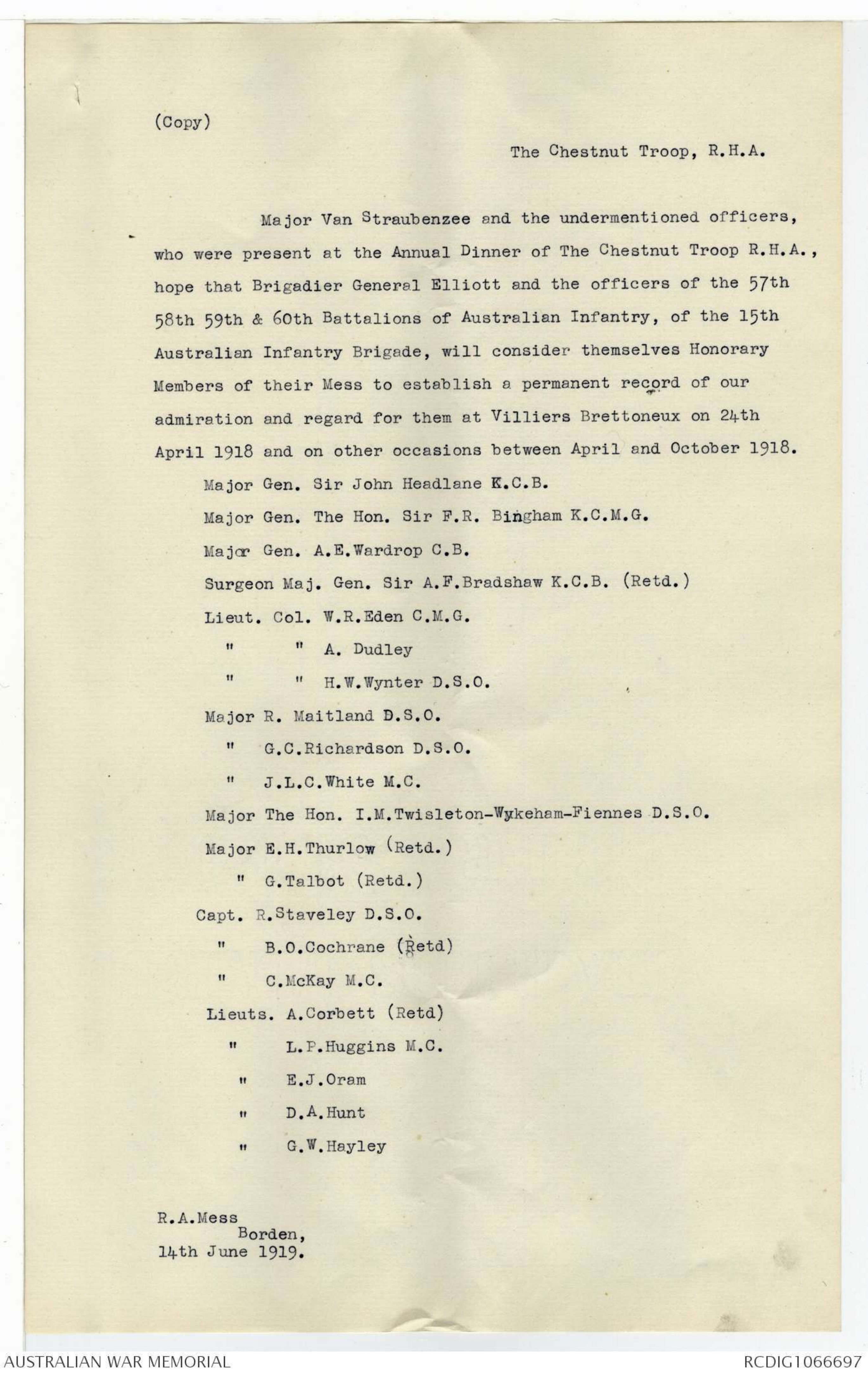
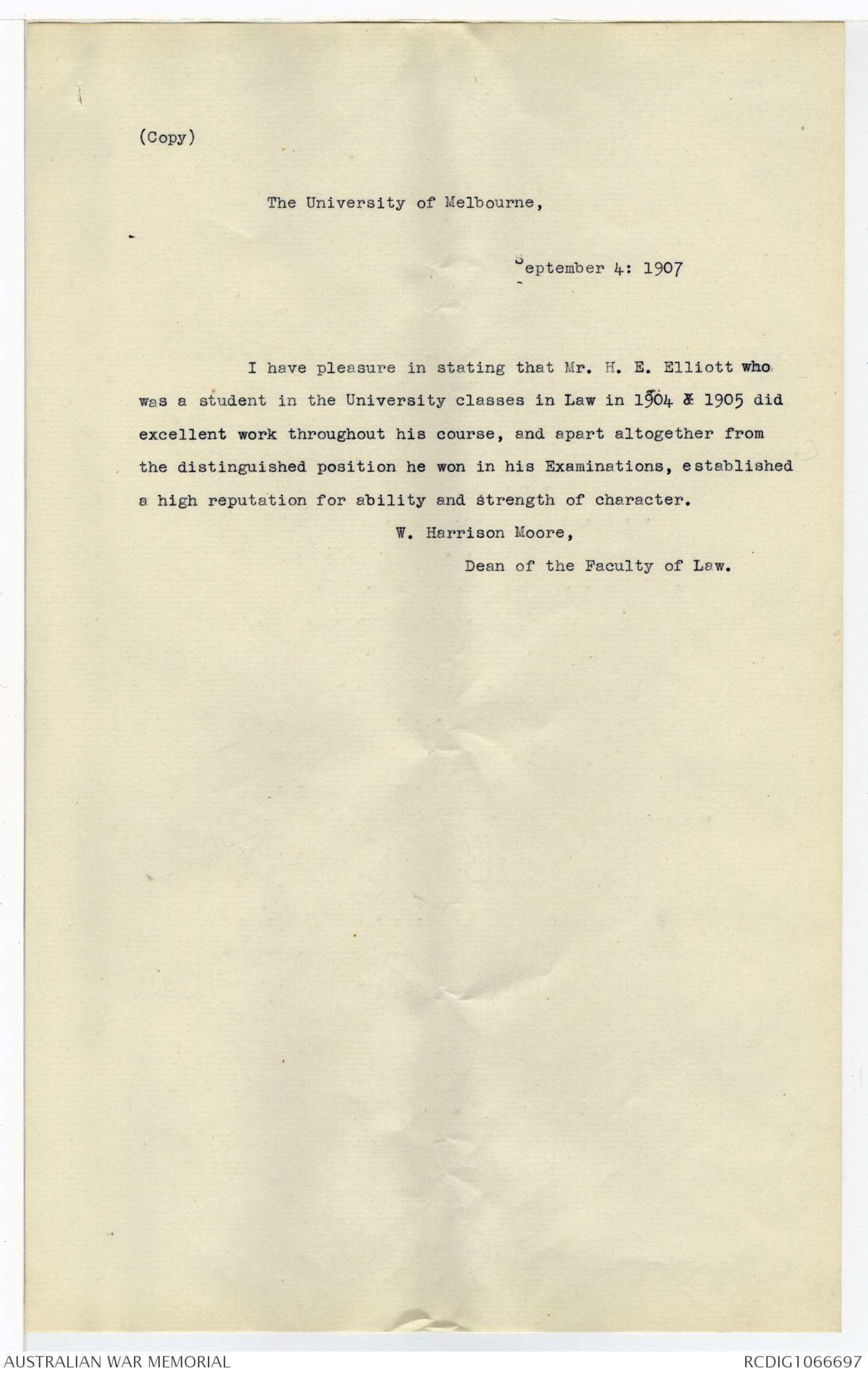
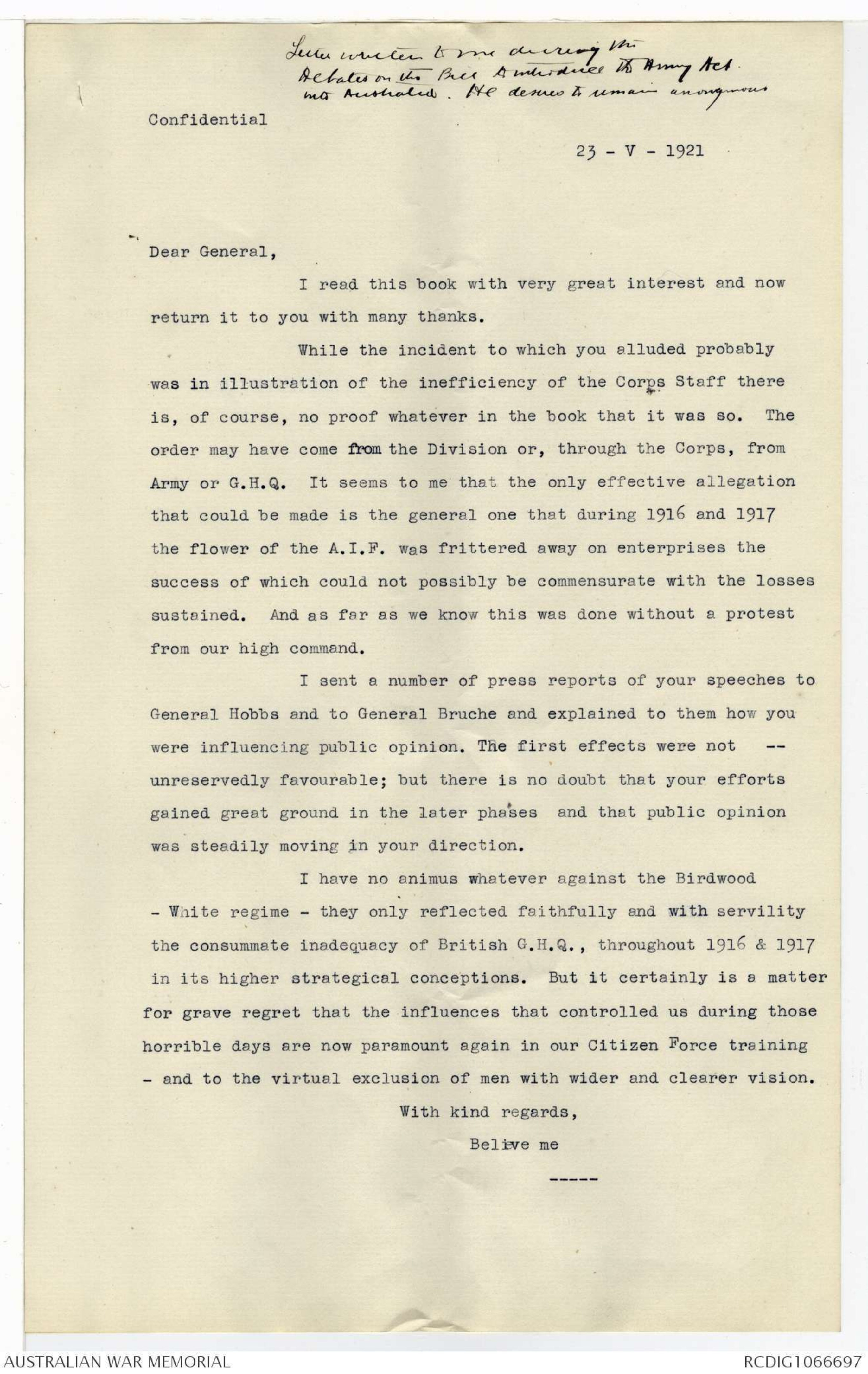
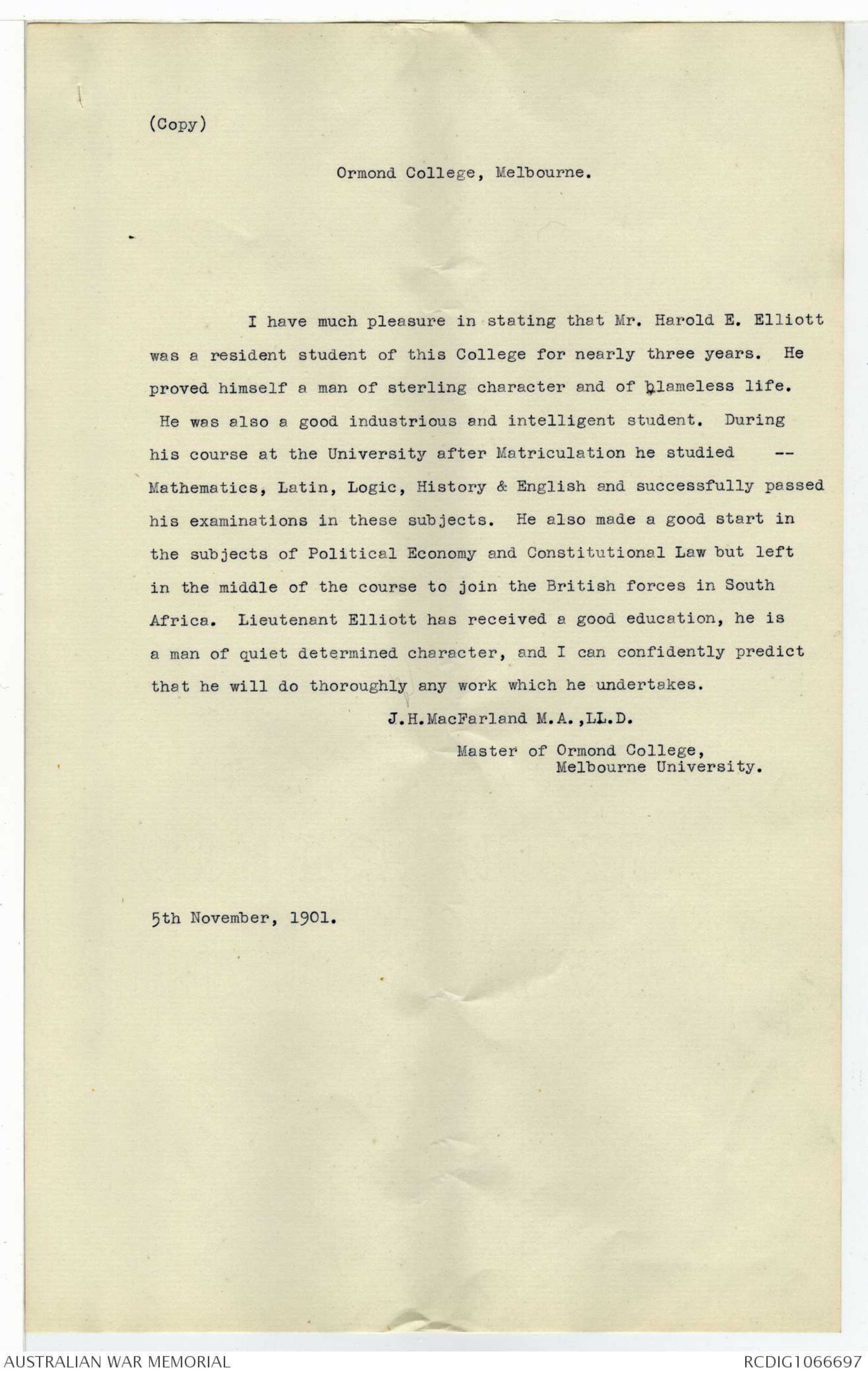
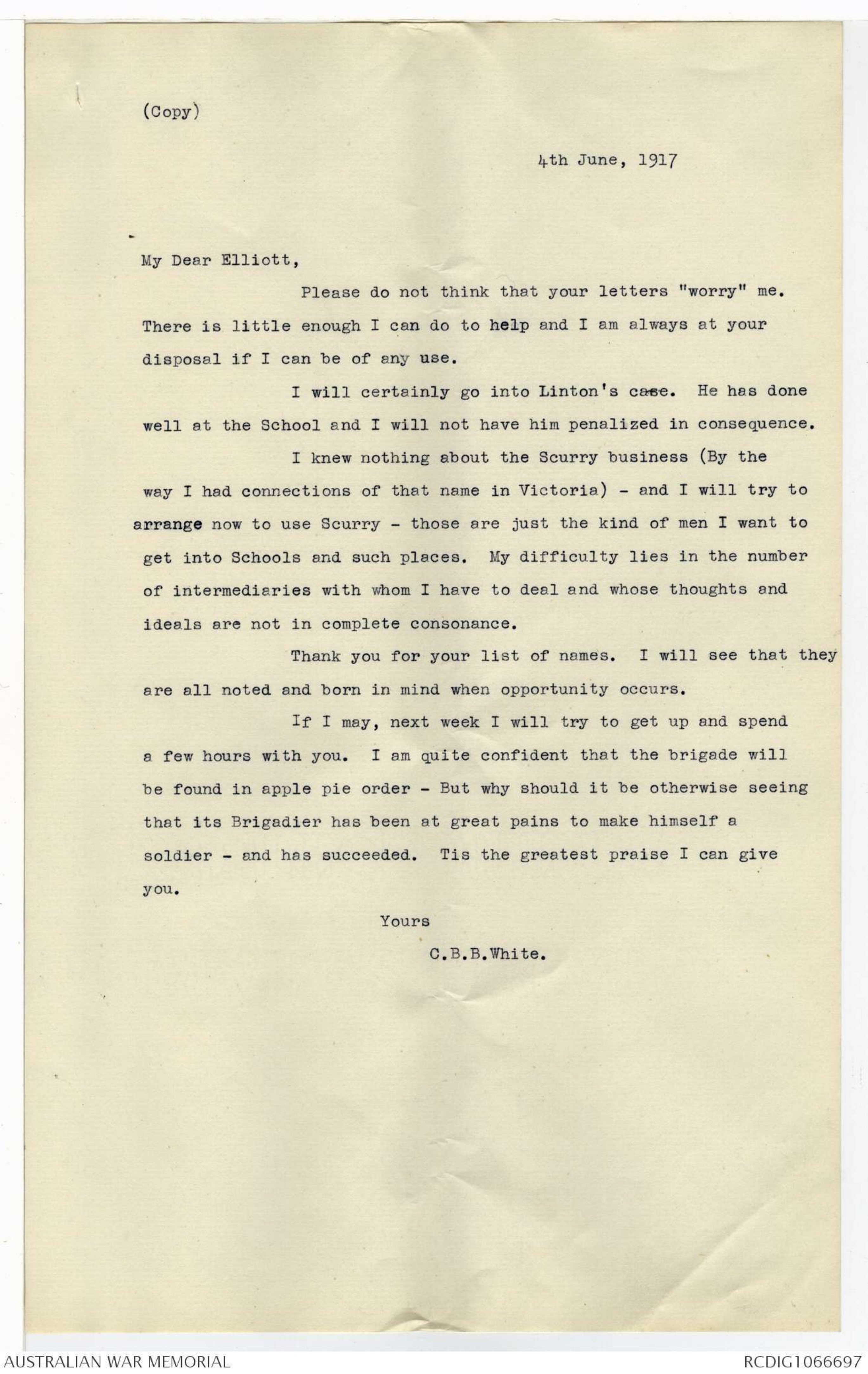
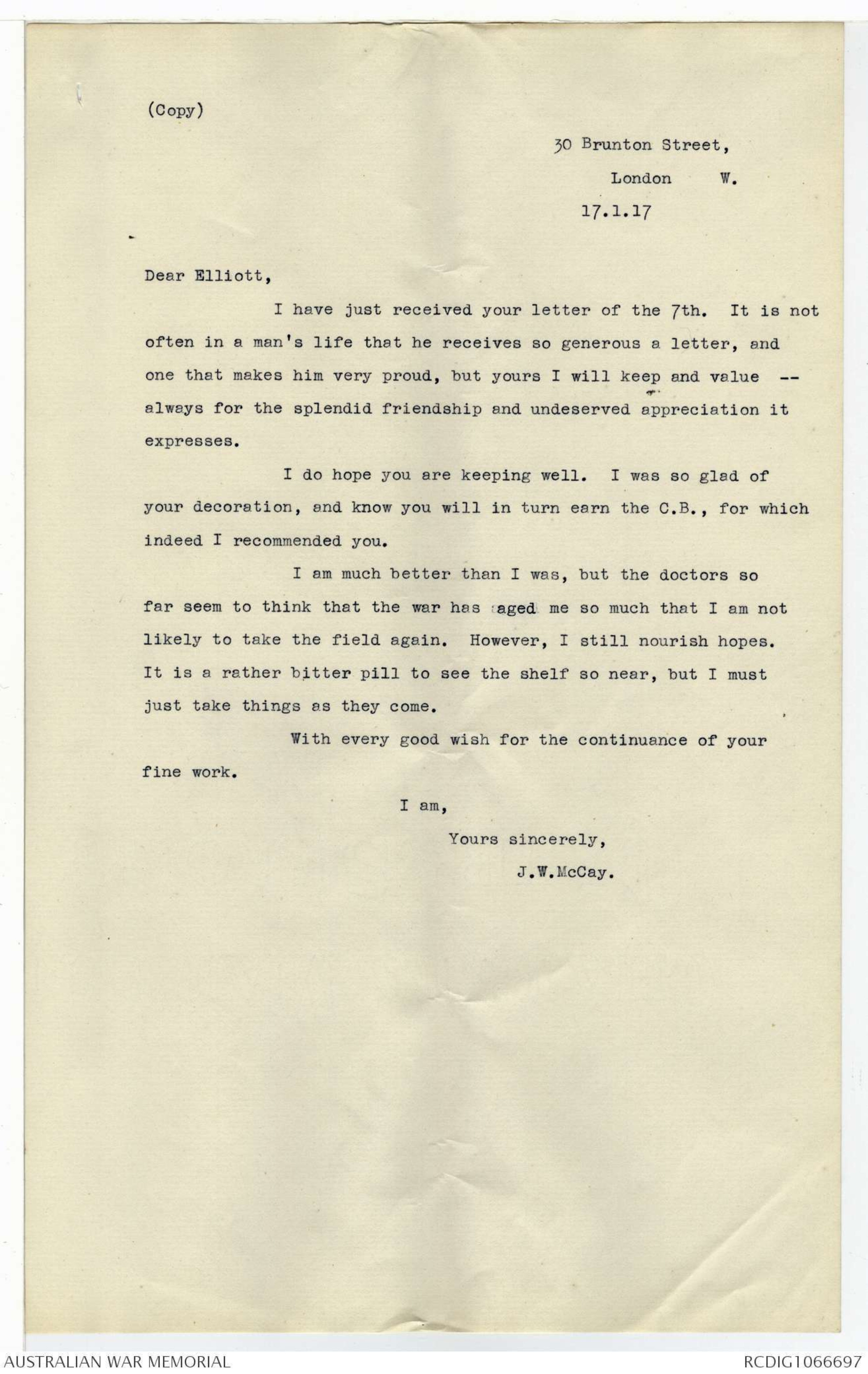
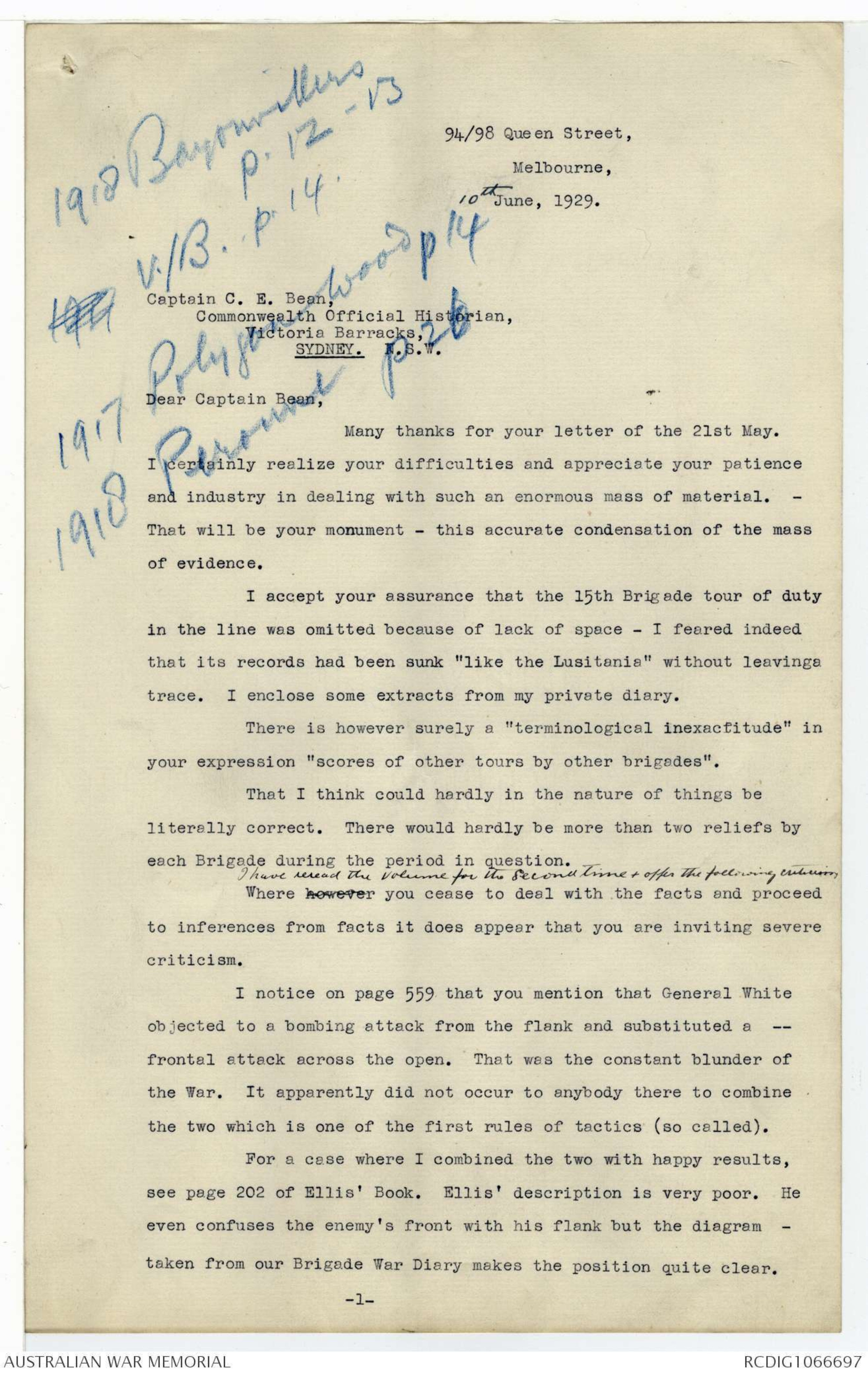
(Copy)
Headquarters,
5th Australian Division,
14th October, 1918.
My Dear General/
I desire to thank you for the report by Major
KERR, M.C. on the amalgamation of the 60th Battalion with the
59th Battalion. The report is most satisfactory and complete
in every respect and reflects great credit on all concerned. I
deeply appreciate the tact and judgment displayed and the --
success achieved by you in the very difficult and delicate task
of re-organising your Brigade under the conditions that obtained
at the time.
Will you please convey my thanks and appreciation
to all who assisted you in the undertaking.
(Sgd) J. TALBOT HOBBS.
Brig. General H.E. ELLIOTT C.B. etc.
(Copy)
Headquarters,
5th Australian Division,
8th April 1918.
Dear General Elliott,
I have just read Lieut-Colonel WATSON's report on
the occupation of BOUZINCOURT; it reflects very great credit on
all concerned, more especially Lieut-Colonel WATSON and Captain
FERRES.
I have shown the report to General BIRDWOOD who
also very much appreciates the fine work done on this occasion.
Yours very sincerely,
J.T.Hobbs.
Brig.-General H. E. ELLIOTT, C.M.G., D.S.O., D.C.M.,
Commanding 15th Aust. Infantry Brigade.
(Copy)
The Chestnut Troop, R.H.A.
Borden,
14th June 1919.
Dear General Elliott,
At our annual dinner at which 25 officers
who have served in The Chestnut Troop were present, I told them of
our close association with the Australian Corps and more especially
with your Brigade. I pointed out that as in the Peninsula War the
43rd and 52 Regts and the Rifle Brigade were made Honorary Members
of our Mess so I would ask them to extend a similar invitation to
yourself and the officers of the 57th, 58th, 59th & 60th Bns. of
Australian Infantry of the 15th Inf. Brigade, as a permanent record
of the great admiration and regard we had for them.
This suggestion was enthusiastically received and I
was asked to send you the enclosed invitation.
We will hope to keep in touch with you at least at
our yearly dinner and perhaps in the future opportunity may occur
for our renewing our friendships.
The Troop goes to Mesopotania in the autumn and
I think it will be some years before we serve at home again. With
all good wishes to yourself and to any of your officers we knew.
Believe me,
Yrs. very sincerely
A.W. Van Straubenzee
(Copy)
The Chestnut Troop, R.H.A.
Major Van Straubenzee and the undermentioned officers,
who were present at the Annual Dinner of The Chestnut Troop R.H.A.,
hope that Brigadier General Elliott and the officers of the 57th
58th 59th & 60th Battalions of Australian Infantry, of the 15th
Australian Infantry Brigade, will consider themselves Honorary
Members of their Mess to establish a permanent record of our
admiration and regard for them at Villiers Brettoneux on 24th
April 1918 and on other occasions between April and October 1918.
Major Gen. Sir John Headlane K.C.B.
Major Gen. The Hon. Sir F.R. Bingham K.C.M.G.
Major Gen. A.E.Wardrop C.B.
Surgeon Maj. Gen. Sir A.F.Bradshaw K.C.B. (Retd.)
Lieut. Col. W.R.Eden C.M.G.
" " A. Dudley
" " H.W.Wynter D.S.O.
Major R. Maitland D.S.O.
" G.C.Richardson D.S.0.
" J.L.C. White M.C.
Major The Hon. I.M.Twisleton-Wykeham-Fiennes D.S.O.
Major E.H.Thurlow (Retd.)
" G.Talbot (Retd.)
Capt. R. Staveley D.S.O.
" B.O.Cochrane (Retd)
" C.McKay M.C.
Lieuts. A.Corbett (Retd)
" L.P.Huggins M.C.
" E.J.Oram
" D.A.Hunt
" G.W.Hayley
R. A. Mess
Borden,
14th June 1919.
(Copy)
The University of Melbourne,
September 4: 1907
I have pleasure in stating that Mr. H. E. Elliott who
was a student in the University classes in Law in 1904 & 1905 did
excellent work throughout his course, and apart altogether from
the distinguished position he won in his Examinations, established
a high reputation for ability and strength of character.
W. Harrison Moore,
Dean of the Faculty of Law.
Letter written to me during the
Debates on the Bill to introduce the Army Act.
into Australia. He desires to remain anonymous
Confidential
23 - V - 1921
Dear General,
I read this book with very great interest and now
return it to you with many thanks.
While the incident to which you alluded probably
was in illustration of the inefficiency of the Corps Staff there
is, of course, no proof whatever in the book that it was so. The
order may have come from the Division or, through the Corps, from
Army or G.H.Q. It seems to me that the only effective allegation
that could be made is the general one that during 1916 and 1917
the flower of the A.I.F. was frittered away on enterprises the
success of which could not possibly be commensurate with the losses
sustained. And as far as we know this was done without a protest
from our high command.
I sent a number of press reports of your speeches to
General Hobbs and to General Bruche and explained to them how you
were influencing public opinion. The first effects were not --
unreservedly favourable; but there is no doubt that your efforts
gained great ground in the later phases, and that public opinion
was steadily moving in your direction.
I have no animus whatever against the Birdwood
- White regime - they only reflected faithfully and with servility
the consummate inadequacy of British G.H.Q., throughout 1916 & 1917
in its higher strategical conceptions. But it certainly is a matter
for grave regret that the influences that controlled us during those
horrible days are now paramount again in our Citizen Force training
- and to the virtual exclusion of men with wider and clearer vision.
With kind regards,
Believe me
----
(Copy)
Ormond College, Melbourne.
I have much pleasure in stating that Mr. Harold E. Elliott
was a resident student of this College for nearly three years. He
proved himself a man of sterling character and of blameless life.
He was also a good industrious and intelligent student. During
his course at the University after Matriculation he studied --
Mathematics, Latin, Logic, History & English and successfully passed
his examinations in these subjects. He also made a good start in
the subjects of Political Economy and Constitutional Law but left
in the middle of the course to join the British forces in South
Africa. Lieutenant Elliott has received a good education, he is
a man of quiet determined character, and I can confidently predict
that he will do thoroughly any work which he undertakes.
J.H.MacFarland M.A.,LL.D.
Master of Ormond College,
Melbourne University.
5th November, 1901.
(Copy)
4th June, 1917
My Dear Elliott,
Please do not think that your letters "worry" me.
There is little enough I can do to help and I am always at your
disposal if I can be of any use.
I will certainly go into Linton's case. He has done
well at the School and I will not have him penalized in consequence.
I knew nothing about the Scurry business (By the
way I had connections of that name in Victoria) - and I will try to
arrange now to use Scurry - those are just the kind of men I want to
get into Schools and such places. My difficulty lies in the number
of intermediaries with whom I have to deal and whose thoughts and
ideals are not in complete consonance.
Thank you for your list of names. I will see that they
are all noted and born in mind when opportunity occurs.
If I may, next week I will try to get up and spend
a few hours with you. I am quite confident that the brigade will
be found in apple pie order - But why should it be otherwise seeing
that its Brigadier has been at great pains to make himself a
soldier - and has succeeded. Tis the greatest praise I can give
you.
Yours
C.B.B. White.
(Copy)
30 Brunton Street,
London W.
17.1.17
Dear Elliott,
I have just received your letter of the 7th. It is not
often in a man's life that he receives so generous a letter, and
one that makes him very proud, but yours I will keep and value --
always for the splendid friendship and undeserved appreciation it
expresses.
I do hope you are keeping well. I was so glad of
your decoration, and know you will in turn earn the C.B., for which
indeed I recommended you.
I am much better than I was, but the doctors so
far seem to think that the war has aged me so much that I am not
likely to take the field again. However, I still nourish hopes.
It is a rather bitter pill to see the shelf so near, but I must
just take things as they come.
With every good wish for the continuance of your
fine work.
I am,
Yours sincerely,
J. W. McCay.
[*1918 Bayonvillers
P. 12- 131917 V./B. p. 14.
1917 Polygon Wood p 14
1918 Peronne p. 26*]
94/98 Queen Street,
Melbourne,
10th June 1929.
Captain C. E. Bean,
Commonwealth Official Historian,
Victoria Barracks,
SYDNEY. N.S.W.
Dear Captain Bean,
Many thanks for your letter of the 21st May.
I certainly realize your difficulties and appreciate your patience
and industry in dealing with such an enormous mass of material. -
That will be your monument - this accurate condensation of the mass
of evidence.
I accept your assurance that the 15th Brigade tour of duty
in the line was omitted because of lack of space - I feared indeed
that its records had been sunk "like the Lusitania" without leavinga
trace. I enclose some extracts from my private diary.
There is however surely a "terminological inexactitude" in
your expression "scores of other tours by other brigades".
That I think could hardly in the nature of things be
literally correct. There would hardly be more than two reliefs by
each Brigade during the period in question.
I have reread the volume for its second time & offer the following criticism
Where however you cease to deal with the facts and proceed
to inferences from facts it does appear that you are inviting severe
criticism.
I notice on page 559 that you mention that General White
objected to a bombing attack from the flank and substituted a --
frontal attack across the open. That was the constant blunder of
the War. It apparently did not occur to anybody there to combine
the two which is one of the first rules of tactics (so called).
For a case where I combined the two with happy results,
see page 202 of Ellis' Book. Ellis' description is very poor. He
even confuses the enemy's front with his flank but the diagram -
taken from our Brigade War Diary makes the position quite clear.
-1-
 Sandy Mudie
Sandy MudieThis transcription item is now locked to you for editing. To release the lock either Save your changes or Cancel.
This lock will be automatically released after 60 minutes of inactivity.